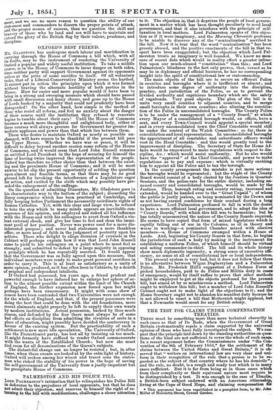OXFORD'S BEST FRIEND.
ffe. GLADSTONE has undergone much labour and mortification in carrying through the House of Commons a bill which, with all its faults, may be the instrument of rendering the University of Oxford a popular and widely useful institution. To take a middle course, is in the House of Commons to incur danger on both sides, since neither party will support Government against its opponents unless at the price of some sacrifice to itself. Of all voluntary tasks, that of a Liberal-Conservative Ministry seems the hardest. It cannot put in action the principles upon which it was formed without braving the alternate hostility of both parties in the House. How far easier and more popular would it have been to bring in a strong and sweeping measure which should have passed with small discussion and, many cheers and gone up to the House of Lords backed by a majority that ocaild not prudently have been disregarded ! On the other hand, how simple is the method of those who resist all reform, and feel no anxiety about the danger of their course until the institution they refused to renovate begins to tumble about their ears ! Until the House of Commons becomes a much more thoughtful and enlightened body, either of these courses will, always procure for Government far greater im- mediate applause and power than that which lies between them. Those who desire to maintain Oxford as nearly as possible un- changed, will have reason to be thankful if the present bill pass the Upper House. Whether we have war or peace, it will be difficult to delay beyond another session some reform of the House of Commons and it would seem that Lord John Russell remains an untitled Lord President in the hope of securing for himself the fame of having twice improved the representation of the people. Oxford has therefore no other choice than that between the exist- ing and the proximate House of Commons ; and it will be most unwise to let slip the present opportunity of settling the question upon almost any feasible terms, so that there may be no good ground left for invoking the interference of a Legislature eager for action, and excited by the strife which may possibly have pre- ceded the enlargement of the suffrage.
On the question of admitting Dissenters, Mr. Gladstone goes in his characteristic way to the bottom of the subject; discarding the flimsy compromise which has been practised at Cambridge, and fully keeping before Parliament the necessarily coordinate rights of Boman Catholics. Yet, with this clear and large view, he refused to take the step which to many minds appears an inevitable con- sequence of his opinion, and employed and risked all his influence with the House and with his colleagues to avert from Oxford a vio- lent external shock, and give her time to feel and shun the immi- nent peril of her position. Never was power used for a more dis- interested purpose ; and never had statesman a more thankless office, or more need of faith in the judgment of posterity upon his actions. Those who delight to allege disunion of counsels in the Cabinet will perhaps explain how it was that Lord John Russell came to yield- to his colleagues on a point where he must feel so strongly, and submitted to defeat by a large majority in opposing a principle which he has repeatedly asserted. It would appear that the Government was so fully agreed upon this measure, that individual members were ready to make great personal sacrifices in order to carry it. This is at least as satisfactory as a unity of mere opinion, produced, as it has often been in Cabinets, by a dearth of original and independent intellects.
If Oxford had possessed, ten years ago, a friend prudent and powerful enough to have induced her to enlarge her sphere of ac- tion to the utmost possible extent within the limit of the Church of England, the further expansion now forced upon her might perhaps have been unnecessary. It might with some show of reason have been contended that two Universities were not enough for the whole of England, and that, if the present possessors were doing the best that could be done with the old foundations, more recent claimants might properly be left to supply their own wants by modern institutions. Actual possession, backed by thus much reason, and defended by the fear there must always be of some had effects on discipline from admitting the rivalries of sects in a place of education, might possibly have decided the controversy in favour of the existing system. But the practicability of such a settlement is now mere idle speculation. The University of Oxford, like the Protectionist party, has lost all by insisting on too much. It might formerly have sufficed to render Oxford commensurate with the wants of the Established Church ; but now she must find room for all denominations of the Queen's subjects. The distasteful change can no longer be resisted • but, in after '
times when these events are looked at by the calm light of history, Oxford will reckon among her wisest and truest sons the states- man who risked the stability of his power in the hope of saving the self-government of the University from a justly-impatient but too precipitate House of Commons.


































 Previous page
Previous page